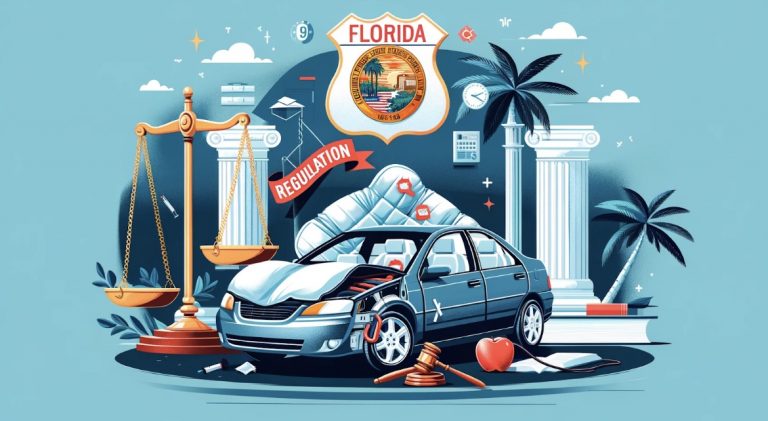Car airbags are an essential safety feature in modern vehicles, designed to protect drivers and passengers during an accident. In Florida, airbags and their usage are regulated by specific laws and guidelines that aim to ensure motor vehicle safety, while also penalizing those who violate these regulations.
The state of Florida requires that airbags be installed in every vehicle and should be used in conjunction with seat belts to provide optimum protection during collisions. The airbag systems in cars must be designed according to federal safety regulations for each specific make, model, and year of a vehicle. Drivers in Florida should be aware that improper use or tampering with airbags can lead to legal consequences.
It is crucial for drivers to understand the importance of airbags and their role in reducing the risk of injury during a car accident. If an accident occurs, affected individuals should consult with Tampa car accident attorneys to ensure they get the compensation they deserve and navigate through the complex legal process in the state of Florida.
Regulatory Framework for Car Airbags in Florida
Florida Airbag Laws and Regulations
Florida has specific laws in place governing the use and handling of airbags in motor vehicles. It is unlawful for any person to knowingly possess, sell, or install a stolen uninstalled airbag, a new or salvaged airbag with removed or altered identification number, or an airbag taken from a stolen motor vehicle. Additionally, any part or object installed in a vehicle to mislead the owner or operator into believing that a functional airbag has been installed is considered a counterfeit or repaired airbag.
Role of the National Highway Traffic Safety Administration
The National Highway Traffic Safety Administration (NHTSA) plays a significant role in the regulation and oversight of airbags in the United States, including Florida. NHTSA is responsible for establishing and enforcing safety standards for motor vehicles, which include regulations related to airbags. The agency also actively investigates potential defects and issues recalls, such as the high-profile Takata airbag recall.
Mandatory Safety Standards and Regulations
Airbags are designed to supplement the protection provided by safety belts, and their effectiveness is regulated by the NHTSA through its mandatory safety standards and regulations. Manufacturers must follow these guidelines ensuring airbags, also known as “Supplemental Restraint Systems” or “SRS”, perform properly in frontal or near-frontal crashes.
Florida adheres to these nationally-established regulations, and vehicle manufacturers must comply for the safety of their customers. Additionally, any airbags that have been recalled, such as those affected by the Takata recall, cannot be reused and are considered sham recycling under 40 CFR section 261.2(g). Airbag modules installed in cars and remaining in the car when it is recycled as scrap metal are considered part of the vehicle and exempt from the recycling regulations when legitimately recycled.
Practical Implications and Safety Considerations
Impact of Airbags on Driver and Passenger Safety
Airbags are a vital safety feature designed to reduce the risk of severe injuries and fatalities during a vehicle crash. In Florida, car airbags are regulated to ensure proper functioning and protect both drivers and passengers. When combined with seat belts, airbags help minimize the force of impact on occupants during a crash, particularly those in the front seat. According to the National Highway Traffic Safety Administration, frontal airbags have saved nearly 2,800 lives since 2013.
However, airbags aren’t a guarantee of complete safety, and certain precautions must be taken into account. For example, children under the age of 12 should be seated in the rear of the vehicle, while those requiring booster seats must use them correctly. Adults must also be mindful of proper seating positioning and always wear their seat belts.
Airbag System Components and Operation
An airbag system, or Supplemental Restraint System (SRS), consists of several components, including:
- Airbag cover
- Sensors
- Controllers
- Inflators
- Wiring
These components work together in the event of a crash, with sensors detecting a sudden change in the vehicle’s speed or impact. Upon detection, the system activates the inflators, quickly filling the airbags with gas to reduce the force exerted upon vehicle occupants.
Common Airbag Malfunctions and Legal Recourse
Airbag malfunctions can have serious consequences, such as unnecessary injuries or even fatalities. Common reasons for malfunctions include:
- Failure to deploy during a crash
- Incomplete deployment
- Shrapnel from airbag components causing harm
In cases where an airbag malfunction has caused severe or permanent injuries, Florida law allows for the possibility of pursuing a product liability claim against the responsible party. If the injuries sustained can be categorized as “serious”, an airbag malfunction lawsuit might help the injured party receive compensation covering both economic and non-economic damages. A competent lawyer can offer guidance in navigating the legal process and help ensure a fair outcome.
In Conclusion
In Florida, car airbags are subject to strict regulations to ensure the safety of drivers and passengers. As per the Florida Statutes, airbags are defined as motor vehicle inflatable occupant restraint systems, including all their component parts.
There are specific laws in place to curb illegal practices. For instance, it is unlawful for individuals to knowingly possess, sell, or install stolen uninstalled airbags or airbags with removed or altered manufacturer’s part identification numbers, as stated in the Florida Statutes. Violators can face penalties as per the state law.
Safety remains a top priority for airbag regulations in Florida. The Florida Department of Highway Safety and Motor Vehicles emphasizes the importance of airbags in saving lives but also acknowledges the need to identify situations where airbags may pose a risk to certain occupants.
To summarize, Florida has regulations in place to ensure car airbags function safely and effectively. The state focuses on preventing illegal practices associated with airbags and continually promotes airbag safety education for the benefit of its residents.



0 Comments